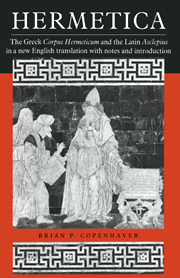 Hermetica
Hermetica Book contents
- Frontmatter
- Contents
- Preface
- Introduction
- Bibliography and abbreviations
- Corpus Hermeticum I
- Corpus Hermeticum II
- Corpus Hermeticum III
- Corpus Hermeticum IV
- Corpus Hermeticum V
- Corpus Hermeticum VI
- Corpus Hermeticum VII
- Corpus Hermeticum VIII
- Corpus Hermeticum IX
- Corpus Hermeticum X
- Corpus Hermeticum XI
- Corpus Hermeticum XII
- Corpus Hermeticum XIII
- Corpus Hermeticum XIV
- Corpus Hermeticum XVI
- Corpus Hermeticum XVII
- Corpus Hermeticum XVIII
- Asclepius
- Notes
- Indexes
Corpus Hermeticum III
Published online by Cambridge University Press: 05 September 2013
- Frontmatter
- Contents
- Preface
- Introduction
- Bibliography and abbreviations
- Corpus Hermeticum I
- Corpus Hermeticum II
- Corpus Hermeticum III
- Corpus Hermeticum IV
- Corpus Hermeticum V
- Corpus Hermeticum VI
- Corpus Hermeticum VII
- Corpus Hermeticum VIII
- Corpus Hermeticum IX
- Corpus Hermeticum X
- Corpus Hermeticum XI
- Corpus Hermeticum XII
- Corpus Hermeticum XIII
- Corpus Hermeticum XIV
- Corpus Hermeticum XVI
- Corpus Hermeticum XVII
- Corpus Hermeticum XVIII
- Asclepius
- Notes
- Indexes
Summary
[1] God is the glory of all things, as also are the divine and the divine nature. God, as well as mind and nature and matter, is the beginning of all things that are since he is wisdom meant to show them forth. The divine is also a beginning, and it is nature and energy and necessity and completion and renewal.
In the deep there was boundless darkness and water and fine intelligent spirit, all existing by divine power in chaos. Then a holy light was sent forth, and elements solidified[]out of liquid essence. And all the gods {divide the parts} of germinal nature. [2] While all was unlimited and unformed, light elements were set apart to the heights and the heavy were grounded in the moist sand, the whole of them delimited by fire and raised aloft, to be carried by spirit. The heavens appeared in seven circles, the gods became visible in the shapes of the stars and all their constellations, and the arrangement of 〈this lighter substance〉 corresponded to the gods contained in it. The periphery rotated 〈in〉 the air, carried in a circular course by divine spirit.
[…]
- Type
- Chapter
- Information
- HermeticaThe Greek Corpus Hermeticum and the Latin Asclepius in a New English Translation, with Notes and Introduction, pp. 13 - 14Publisher: Cambridge University PressPrint publication year: 1992


